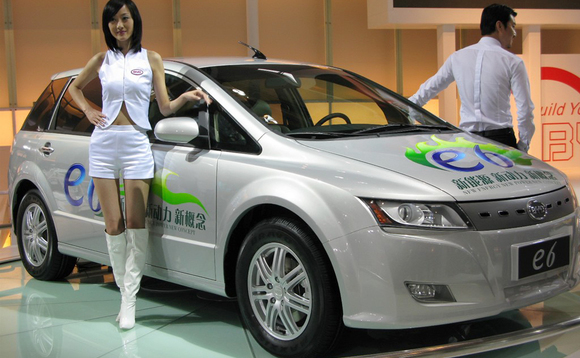
VCs monetize energy efficiency

Chinese government incentives to firms operating in the energy-efficient vehicles industry have been generous. Is there a catch?
Being selected by a government for tax breaks, grants, subsidies and low-interest loans can represent the difference between profit and loss for companies in nascent industries. For participants in China's energy-efficiency space, these opportunities chance has become a reality.
Beijing is known to subsidize up to 50% of the capital needs of firms whose work complements official policies to promote carbon-efficiency and energy-efficiency and facilitate the development of local technology. Clean-energy vehicles - plug-in hybrids and pure electric vehicles (EVs) - are one of seven emerging strategic industries highlight in China's 12th Five-Year Plan as being crucial to achieving these goals.
The government has pledged to spend RMB100-200 billion ($15.2-31.3 billion) over the next decade to support R&D and provide subsidies and infrastructure, with a view to having five million EVs on the road by 2020.
Chris Bongars, founder and CEO of Asia Pacific greentech investment advisory SustainAsia, says China hopes EVs will do for it what hybrids have done for the Japanese: become the leading automaker for drivers of the future. "China knows it can't compete in the hybrid vehicle arena - Japan has had its head start for more than a decade - so it's putting 100% of its effort into the electric vehicle sector," he says.
To this end, state-owned car manufacturers are being encouraged to develop EVs and the state-owned electricity grid firms have been tasked with building out a recharging network. This translates to real opportunities for private enterprises, from lithium battery makers for EVs to charging station developers, and private equity is along for the ride.
EVs driving opportunities
Lithium-ion battery maker Boston-Power is among the latest to benefit. Last month, the Chinese government, in partnership with GSR Ventures and existing investors Oak Investment Partners and Stockholm-based Foundation Asset Management committed $125 million to the company. That capital plus government incentives - include grants, low-interest loans and related financial and tax incentives - will be used to bolster manufacturing, R&D and business development activities in China.
Boston-Power further plans to open a state-of-the-art R&D and EV battery engineering facility in Beijing capable of producing 400 megawatt hours of lithium-ion battery cells a year by the end of 2012. It fits in well with China's goal to expand its annual production capacity of power batteries to 10 GW by 2015.
"The most critical element in creating wide use of EVs is the need for a highly reliable, high-density battery solution," Sonny Wu, managing director of GSR, tells AVCJ. "Battery production is a very controlled environment, so if you can get government subsidies, it creates an edge in terms of opportunity and support. The market is huge for this - the Beijing government wants 300,000 of these cars on the road in five years, and that's about $5 billion worth of batteries."
Other PE transactions in the space include the $29.5 million investment into Prudent Energy, a US- and Beijing-based energy storage firm, by existing investors including Draper Fisher Jurvetson, DT Capital Partners and Northern Light Venture Capital earlier this month. UK-listed Origo Partners last year committed $4.3 million to Chinese lithium-ion battery manufacturer Unipower Battery.
While optimism is there, EVs are far from becoming commercialized products on a large scale - sales of pure EVs and hybrids reached 5,000 units and 4,000 units, respectively, in 2010, according to J.D. Power. This is hardly surprising given that an EV costs about four times the price of a standard automobile and requires an abundance of battery-charging stations to make using it practical.
As a result, the immediate potential for EVs lies in the public transportation sector: local governments have introduced subsidies on purchases of buses and taxis and they have the power to instruct state-owned providers to participate. Even then, such programs are only visible in a handful of cities. Shenzhen, one of 13 cities in the 2009 pilot program, is an example of the challenges involved. Two years on, electric taxis were still found to cost 80% more than the Volkswagen taxis in the city.
But that doesn't mean progress won't follow.
"Five or six years ago, not many people drove hybrids, but now they're mainstream," Bongars says. "At this stage, public subsidies are necessary to boost innovation and establish the infrastructure. Wider adoption will take off once electric vehicles become more affordable to general consumers and subsidies are lifted."
Making power in China
The cost of lithium-ion batteries manufactured in China is expected to drop to below RMB2 per Watt hour from the current RMB3-6 per Wh over the next five years. It helps that the country is a cost-effective producer of EV batteries: Materials are less expensive (China is a major lithium producer), labor is cheaper, and expansion is easy. This combination of factors enticed the likes of Boston-Power.
"Boston-Power has always considered itself a global company in a global market, pursuing the best opportunities that make the most sense in terms of driving the adoption of its products and technology. As part of that strategy, the company puts its staff and operations where they will provide the greatest value to customers, prospects and partners," a Boston-Power spokesman tells AVCJ.
Moving operations halfway around the world isn't attractive to all overseas firms. Therefore, the traditional investment option of a Sino-foreign joint venture, under which the foreign party contributes capital and technology and gets local market access in return, remains popular.
According to one China-based private equity fund manager who has invested in a local lithium battery company, the government is keen to attract Western developers because their technological know-how is unparalleled. "There's a lack of innovation in China, and the problem with companies in the US is that the manufacturing scale is very expensive. It makes more sense for the two to go it together rather than a pure Chinese company doing it or a pure Western. It's a win for everyone."
The flip side of the joint venture approach is the technology transfer requirements - and the risk that foreign firms unwittingly give away more than they intended. First, Chinese law states that intellectual property developed locally belongs to the local entity. Second, IP enforcement is notoriously weak, so once a technology goes out the door it is unlikely to come back, no matter how long the foreign party spends in court..
"The Chinese are not good at stimulating new technology but they act like a vacuum, take what they see and build on it," according to one industry participant. "It doesn't take much to be very good reverse engineering."
It is worth noting that plenty of firms in other industries toughen up their internal controls and are willing to take the IP risk in China. However, there are other considerations for companies in the EV space: Any sector so heavily reliant on government subsidies is stuck if these benefits are withdrawn.
Beijing has already become more frugal in its allocations. From October 1 of this year, the threshold for subsidy qualification increased: Energy-efficient vehicles must weigh 1,205-1,320 kilograms and have average fuel consumption of at least 6.3 liters per 100 kilometers, up from 6.9 l per 100 km. The subsidy in question is worth RMB3,000 ($470) per vehicle.
Nevertheless, incentives remain. The fund manager who has invested in a Chinese ion lithium battery maker says his portfolio firm is exploring ways to receive government subsidies. Although progress is slow, there is recognition that, even if subsidies don't materialize, the company is still a first-mover in a country that is doing its utmost to promote the sector.
"There are really no drawbacks to investing in this space right now," the source says. "The technology is transferring this way, and China is the definitive market to watch right now."
Latest News
Asian GPs slow implementation of ESG policies - survey
Asia-based private equity firms are assigning more dedicated resources to environment, social, and governance (ESG) programmes, but policy changes have slowed in the past 12 months, in part due to concerns raised internally and by LPs, according to a...
Singapore fintech start-up LXA gets $10m seed round
New Enterprise Associates (NEA) has led a USD 10m seed round for Singapore’s LXA, a financial technology start-up launched by a former Asia senior executive at The Blackstone Group.
India's InCred announces $60m round, claims unicorn status
Indian non-bank lender InCred Financial Services said it has received INR 5bn (USD 60m) at a valuation of at least USD 1bn from unnamed investors including “a global private equity fund.”
Insight leads $50m round for Australia's Roller
Insight Partners has led a USD 50m round for Australia’s Roller, a venue management software provider specializing in family fun parks.






